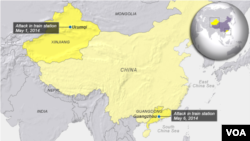Chinese authorities have arrested seven people suspected of involvement in a train station knife attack and bombing late last month in the restive region of Xinjiang.
The official Global Times newspaper said Saturday that the seven were captured on May 14 in Xinjiang and are being questioned.
One person was killed and 79 were wounded on April 30 when attackers set off explosives and slashed passengers at the South Station in the regional capital, Urumqi. Two of the assailants were killed during the attack.
The attack took place on the same day that Chinese President Xi Jinping visited Xinjiang where he promised to go on the offensive against what the government considers separatists.
The government blames extremists from the predominantly Muslim Uighur ethnic group for a series of increasingly complex attacks in recent months.
Government critics say the violence is driven by the government's restrictions on Muslim religious life and its policies that favor members of the Han ethnic group.
The government has blamed much of the violence on the East Turkestan Islamic Movement or ETIM, which Beijing says is funded by foreign extremists.
There is disagreement about the extent to which ETIM is involved, however, with many foreign analysts saying that China is exaggerating the threat.
The official Global Times newspaper said Saturday that the seven were captured on May 14 in Xinjiang and are being questioned.
One person was killed and 79 were wounded on April 30 when attackers set off explosives and slashed passengers at the South Station in the regional capital, Urumqi. Two of the assailants were killed during the attack.
The attack took place on the same day that Chinese President Xi Jinping visited Xinjiang where he promised to go on the offensive against what the government considers separatists.
The government blames extremists from the predominantly Muslim Uighur ethnic group for a series of increasingly complex attacks in recent months.
Government critics say the violence is driven by the government's restrictions on Muslim religious life and its policies that favor members of the Han ethnic group.
The government has blamed much of the violence on the East Turkestan Islamic Movement or ETIM, which Beijing says is funded by foreign extremists.
There is disagreement about the extent to which ETIM is involved, however, with many foreign analysts saying that China is exaggerating the threat.





